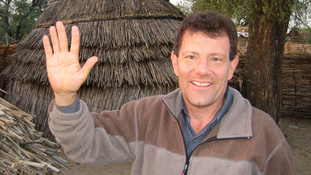
|  |  |  Travel Writers' Resources | January 2009 Travel Writers' Resources | January 2009  
Win a Trip You Wonít Forget
 New York Times New York Times
go to original


| | Win a Trip With Nicholas Kristof, 2009: The columnist invites students to enter a contest for a reporting trip to Africa this spring. Second prize is two trips. |  |
A few years ago, soon after I returned disconsolate and shellshocked from a trip to Darfur, I found New Yorkers burning with moral outrage.

The spark wasnít genocide, war or poverty, but rather homelessness ó of a red-tailed hawk nicknamed Pale Male. Managers of a Fifth Avenue apartment building had dismantled his nest.

Fury! Television cameras! And public pressure that led to a solution for rebuilding the nest.

I wondered how some of that compassion for a hawk could be rechanneled to help human beings like those I had just seen dying in Darfur. The potential is vast: just imagine if we felt the same sympathy for the 25,000 children who will die today of poverty as we do for, say, a lost and terrified puppy on the street. But itís very difficult to generate activism for distant people whom we canít visualize.

So I concocted a contest to take a university student with me on a reporting trip to Africa. I figured that the studentís journey might help connect American students to truly desperate needs abroad.

Weíve held two of these student trips so far, and today Iím delighted to announce the third.

If you apply, you should know that within The Times, my colleagues say that first prize is one trip with Kristof. Second prize is two trips.

But theyíre just jealous. The trip may not be comfortable, but if you donít obsess about rats under the beds, bats in the outhouses or drunken soldiers at checkpoints, then the trip will be memorable and perhaps even life-changing.

If you win, you wonít be practicing tourism but journalism. Youíll blog for nytimes.com and file videos for The Times and for YouTube.

Iím doing this for two reasons. First, I want to engage young people about global issues that Iím passionate about. Second, itís good journalism, for youíll bring a tool to reporting from Africa that I no longer have: a fresh eye.

The contest is open to undergraduate or graduate students at American universities. Details for applying are on my blog, www.nytimes.com/ontheground. You can apply by essay or by video on YouTube, or both. The International Committee of the Red Cross will help me winnow the applicant pool, and Iíll pick the winner.

For my first win-a-trip journey, I chose a Mississippi student, Casey Parks, who had never been out of the country. In rural Cameroon, we came across Prudence Lemokouno, a mother of three who was dying in childbirth. We gave money and donated blood in hopes of saving Prudence. We failed, and we watched Prudenceís life ebb away.

Casey and I visited the Central African Republic and played basketball in a forest clearing ó against Pygmies. Then we traveled to insecure areas to understand the human toll of banditry. Our reporting went well: we were held up at gunpoint. Twice.

The second trip, with Leana Wen, a medical student, and Will Okun, a Chicago teacher, started with a tour of booming Rwanda. Then in Congo we dined with a warlord in the jungle ó and interviewed villagers raped by his troops.

A documentary of that second trip, ďReporter,Ē premiered at the Sundance Film Festival on Friday and will be shown on HBO later this year.

In this brutal economic environment, itís especially difficult to sustain compassion for people out of our line of sight. But the contest winner can help put a face on global poverty ó the child who contracts malaria for want of a $5 bed net.

Grass-roots reporting encourages not only compassion but also a tough-minded appreciation for the messiness of life and the complexity of solutions. In many cases, the family is too poor to buy a bed net not just because of poverty but also because Dad spends the family money on his priority, which is banana beer.

One of the failures of the American education system is that it rarely exposes students to life around the world. As Bill Gates put it in his 2007 Harvard commencement address, ďI left Harvard with no real awareness of the awful inequities in the world.Ē

Letís hope that Barack Obamaís presidency makes public service more appealing. But if you want to save the world, you first must understand it.

So, embed yourself deep within a developing country for a summer or a year. I wish colleges would offer credit for such gritty experiences ó and extra credit for getting intestinal worms.

Iíve posted some overseas volunteer possibilities, from helping at a maternity hospital in Somaliland to teaching English to brothel children in India, on my blog. Even if you donít win my trip, you can still win your own.

I invite you to comment on this column on my blog, On the Ground. Please also join me on Facebook, watch my YouTube videos and follow me on Twitter. |

 |
|  |



